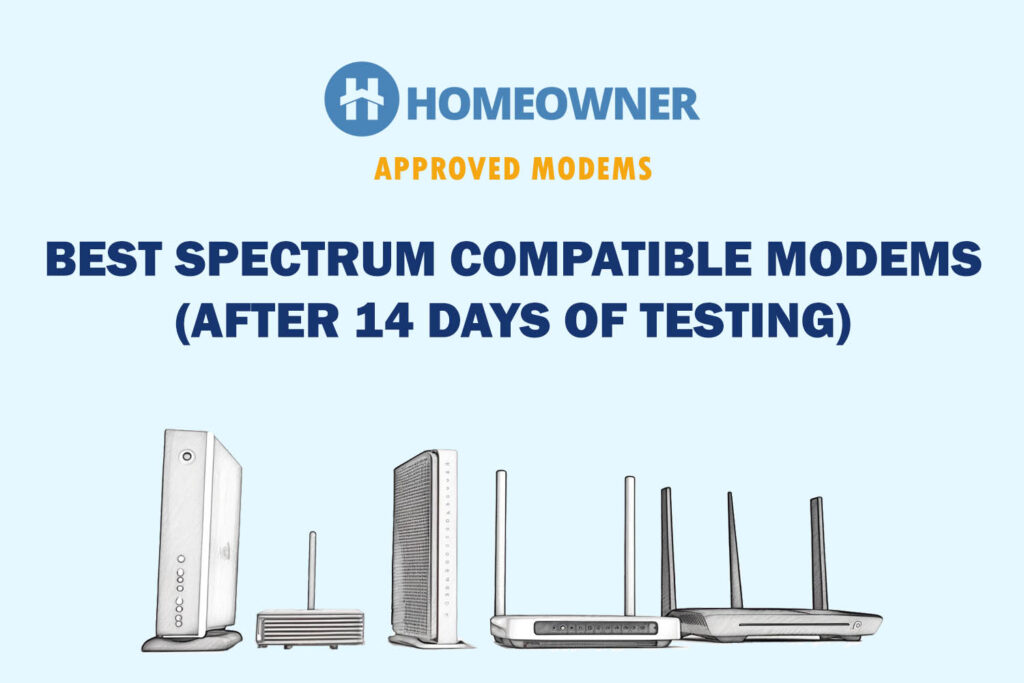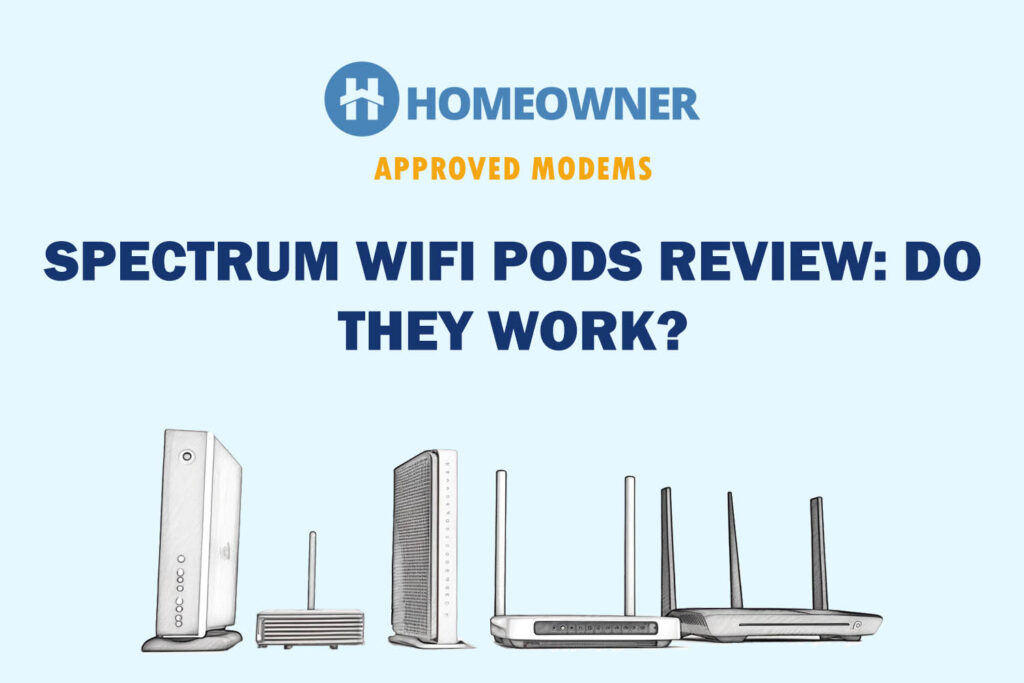Are you stuck deciding between T-Mobile 5G Home and Spectrum cable internet? The right choice depends on your usage requirements and preferences. In this article, we'll take a deep dive into both service providers, compare them, and see how they align with your requirements.
With Home Internet service, T-Mobile expands its footprint in the market with 5G services. Which is over and above its wide cellular network coverage that spans 50 states in the US. Contrary, Spectrum is the second largest cable internet provider and has been bringing high-speed internet to homes across 42 states.
Key Differences Between T-Mobile Home & Spectrum Cable
- Plans: Spectrum offers multiple plans starting at 300 Mbps and scaling up to 1 Gbps while T-Mobile has a single plan for its home internet service, where the speeds are contingent on multiple factors.
- Speeds: The maximum download speed on Spectrum is around 900 Mbps and upload can go up to 35 Mbps. For T-Mobile, the speeds vary between 72-245 Mbps depending on various factors like cellular reception, proximity to the tower, traffic, etc.
- Data Cap: Both Spectrum and T-Mobile operate without any data limits. All the plans on the Spectrum are unlimited, and the sole plan on T-Mobile isn't any different.
- Pricing: Spectrum starts at $50 for a month for its lowest speed tier and scales up to $89 for the highest. Prices are hiked after a year. The T-mobile only plan costs $50, with the promise of remaining the same.
- Contracts: Neither Spectrum nor T-Mobile binds you by contract. You are free to change service providers without paying hefty cancellation charges.
- Availability: Spectrum operates in 42 states, covering important cities and extending services to patches of rural areas. T-Mobile is one of the largest cellular network providers, with a presence across 50 states.
- Installation: Spectrum charges for pro-installation for the last mile installation inside your house but allows self-installation. T-Mobile home internet doesn't require any special installation and is a simple plug-and-play after activation.
- Support: Spectrum is notoriously infamous for its unsatisfactory customer service, while T-Mobile placed top in the latest customer satisfaction survey among the other internet service providers, sans the fiber-based ones.
Detailed Comparison Between T-Mobile Home Internet and Spectrum Cable
The 500 Mbps internet plan from Spectrum handled surfing, TV streaming, work-from-home, and gaming requirements for two years. As a T-Mobile voice phone user, I grabbed the opportunity to test drive home internet for 30 days. It came in time to meet my internet requirements when I was temporarily out of town for work.
The subsequent sections are an account of my experience and comparative analysis of both service providers across different aspects of performance and service.
So, let's dig in!
Internet Plans
T-Mobile home internet keeps things simple with a single plan costing $50, diverging from the standard practice of offering multiple plans based on speed tier. The speeds depend on the proximity of its tower, the total number of subscribers sharing the airspace, and other environmental conditions.
You'll not be paying anything extra in the future, even if coverage improves and speeds get upgraded.
| Plan | Download | Upload | Price | Data Cap |
|---|---|---|---|---|
| T-Mobile Home Internet | 72-245 Mbps | 15-31 Mbps | $50 | Unlimited |
Spectrum, on the other hand, has three internet plans. Packages start at $49.99 for the lowest speed tier, with jumps of $20 to the highest speed tier costing $89.99. After a year, your prices are prone to change.
| Plan | Download | Upload | Price | Data Cap |
|---|---|---|---|---|
| Shop Internet | Up to 300 Mbps | UpUp to 10 Mbps | $49.99 | Unlimited |
| Shop Ultra | Up to 500 Mbps | Up to 20 Mbps | $69.99 | Unlimited |
| Shop Gig | Up to 1 Gig | Up to 35 Mbps | $89.99 | Unlimited |
If you prefer bundling TV, and landline together, go for Spectrum; if your internet requirements are fairly simple, stick to T-Mobile.
Speeds and Latency
The 500 Mbps plan from Spectrum was close enough to the maximum limits. With a 500 Mbps router, I got 440 Mbps in download and 22 Mbps in upload.

With T-Mobile, the download and upload speeds varied hugely during peak and non-peak hours. During the non-peak hours, downloads averaged close to 90 Mbps and uploads at 19 Mbps.
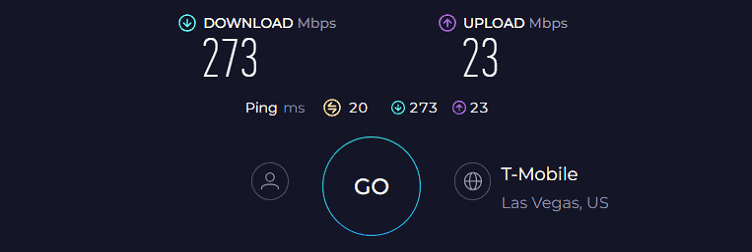
At peak usage hours, it dropped further, averaging close to 52 Mbps in download and 11 Mbps in upload. T-Mobile was strewn with high latency, with spikes crossing 500 ms at times.
On a wired connection, the latency was far more predictable, in the range of 30-70 ms. Spectrum fares well in this aspect.
Performance & Reliability
Spectrum was more consistent in the speeds it delivered and its reliable performance level. Being based on the cellular network, T-Mobile lacked consistency and reliability. The speed fluctuations were substantial, with high latency at times.
If your usage is limited to light activities like surfing, streaming music, videos, and mobile gaming, T-Mobile fares decently. When it comes to gaming, T-Mobile struggles with high ping, stealing the fun of gaming.
In comparison, Spectrum was more reliable. I was able to play games like Cyber Punk 2077, Assasin's Creed, and Last of Us with no hassles.
I hardly faced any downtime with T-Mobile. But what matters more is what one was able to accomplish during the uptime. While there was one outage in Spectrum during the testing period, it was most reliable when it came to speed and reliability.
T-Mobile despite having good uptime was a tad bit difficult to rely on during peak hours for any data-heavy activity.
🐌 If your Spectrum internet is experiencing lagging, you may want to check out our How to Fix Spectrum Slow Internet Issue article.
Availability or Coverage
Charter Spectrum is the second largest cable internet provider and has a footprint across 412 states and over 200 major cities. Take a look at its coverage map:
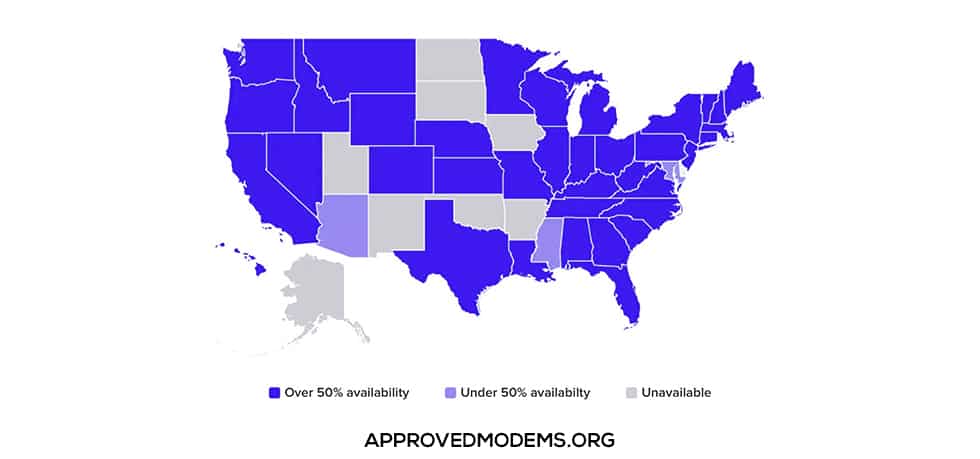
Major cities and towns where Spectrum is available:
| Alabama | Kansas | Nebraska | Tennessee |
| Arizona | Kentucky | Nevada | Texas |
| California | Louisiana | New Hampshire | Vermont |
| Colorado | Maine | New Jersey | Virginia |
| Connecticut | Maryland | New Mexico | Washington |
| Florida | Massachusetts | New York | West Virginia |
| Georgia | Michigan | North Carolina | Wisconsin |
| Hawaii | Minnesota | Ohio | Wyoming |
| Idaho | Mississippi | Oregon | |
| Illinois | Missouri | Pennsylvania | |
| Indiana | Montana | South Carolina |
T-Mobile has a wide coverage, spanning across all 50 states, with low, medium, and high bands of 5G coverage covering over 90 percent of the total area. Take a look at its coverage map:
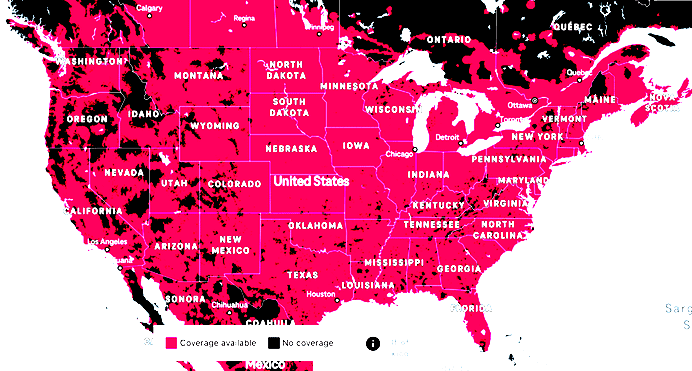
Major states where T-Mobile is available:
| Alabama | Hawaii | Massachusetts | New Mexico | South Dakota |
| Alaska | Idaho | Michigan | New York | Tennessee |
| Arizona | Illinois | Minnesota | North Carolina | Texas |
| Arkansas | Indiana | Mississippi | North Dakota | Utah |
| California | Iowa | Missouri | Ohio | Vermont |
| Colorado | Kansas | Montana | Oklahoma | Virginia |
| Connecticut | Kentucky | Nebraska | Oregon | Washington |
| Delaware | Louisiana | Nevada | Pennsylvania | West Virginia |
| Florida | Maine | New Hampshire | Rhode Island | Wisconsin |
| Georgia | Maryland | New Jersey | South Carolina | Wyoming |
Costs & Contracts
The pricing of T-Mobile is straightforward. The $50 is inclusive of fees and taxes. There are no rental charges for the WiFi gateway. The price doesn't change after a year, unlike Spectrum. There is a one-time device connection charge of $35, similar to the activation fee for other service providers.
With Spectrum, over your package fees, you will incur taxes on a monthly cycle. While the modem is free of charge, if you don't have a router that will cost you $5 on your monthly bill. Here's how to lower it.
The standard installation fee is $59.99, and if you choose to do the installation by yourself, there is a service activation charge of $24.99. The cost of your package increases after a year.
There are no contracts or cancellation fees with either of these service providers and if you cancel the plan within 30 days, you're likely to get a full refund. Solely in terms of pricing clarity and structure, T-Mobile looks like a better option.
👉 If you need equipment for Spectrum, here are a few recommendations:
Installation & Setup
T-Mobile has a simple plug-and-play install. Subscribe, activate, and get the equipment, and you are good to go. Spectrum, being a cable internet service, will involve a last-mile installation from the nearest point, which is bound to take time, depending on the professional's availability.
The in-house installation and activation by a professional will entail booking appointments and being physically present in the home. It incurs a standard charge. You can skip this by choosing to self-install, which can take anywhere between 30-45 minutes.
From the standpoint of installation and readiness of the setup, T-Mobile scores highly, thanks to wireless connectivity, and plug-and-play quick installation.
Pros & Cons of T-Mobile Home Internet
Pros
- Easy plug-n-play setup
- No device rentals
- Excellent coverage across the US
- Fixed pricing
- Additional benefits for T-mobile phone users
Cons
- High latency
- Speed fluctuations
Pros & Cons of Spectrum Cable
Pros
- High download speeds
- Dedicated wired connection
- Free modem
- No contract
- Unlimited data downloads
Cons
- Price hike after a year
- Customer service
Customer Service & User Reviews
You can contact customer service via phone call, text message, or the mobile application for either of these service providers. But it was easier and quicker to reach technicians with T-Mobile than Spectrum. It was easier to cancel the subscription with T-Mobile, while Spectrum made the process tedious.
This is reflected in the yearly customer satisfaction survey, where T-Mobile tops the list and Spectrum stays a long way below it in the list of internet service providers.
Let's look at some of the user reviews of Spectrum Internet:




Here's what some of the T-Mobile users have to say about their experience:




Frequently Asked Questions
It depends on your requirements. If you are a heavy user with gaming and streaming requirements, Spectrum is a better choice. If your usage is limited, T-Mobile home internet would be good enough.
No. While Spectrum has mobile 5G internet services on offer, it doesn’t offer a dedicated home internet plan with a dedicated WiFi gateway.
Yes, Spectrum Cable offers high-speed internet without any data cap. It allows unlimited downloads and uploads.
Yes, T-Mobile home internet delivers speed adequate for streaming, surfing, and mobile gaming. The download speeds may vary between 72-245 Mbps depending on the location and other environmental factors affecting the cellular network.
T-Mobile Home service is based on a mobile cellular network while Spectrum is a major player in the cable-based internet space. If you are not into gaming or have to work from home, T-Mobile home internet is an absolute steal if you are an existing T-Mobile mobile user.
In cases where you are involved in data-heavy activities like streaming, or gaming or require the stability to complete work from home, you're better off with Spectrum.



